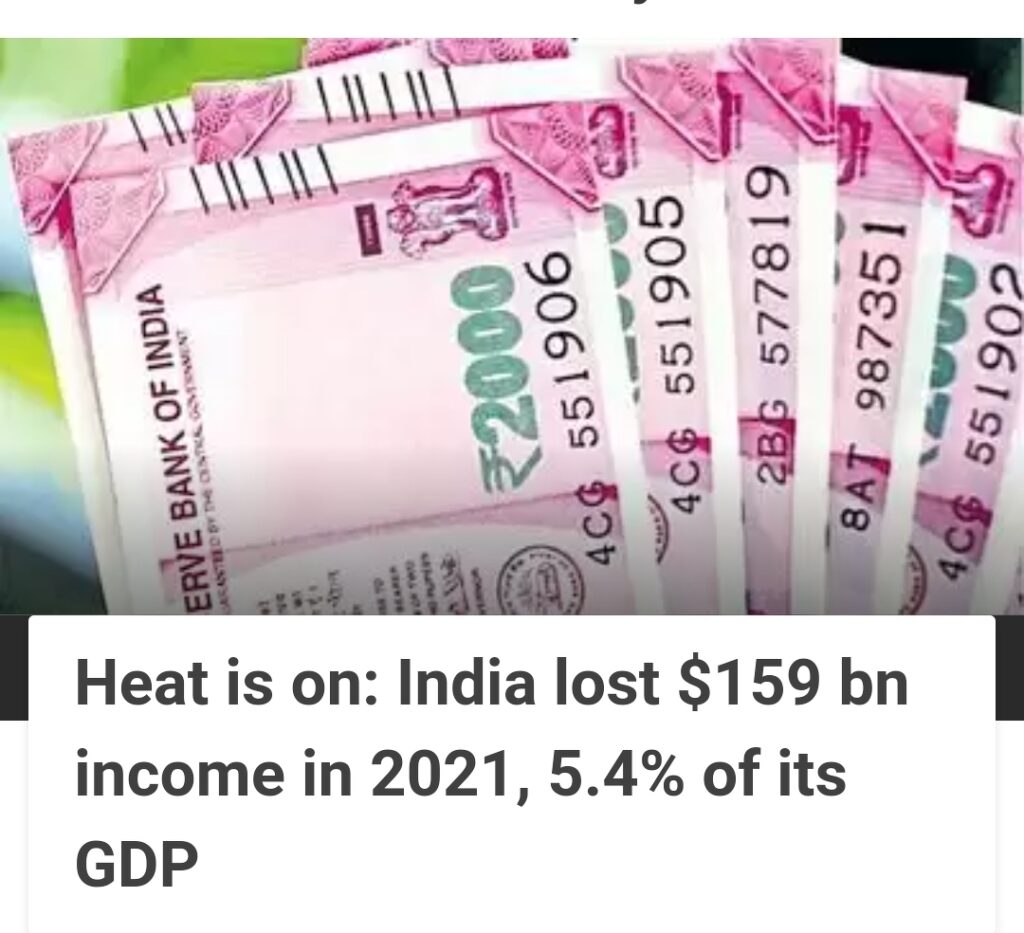India suffered an income loss of U.S. $159 billion, 5.4% of its gross domestic product, in the service, manufacturing, agriculture and construction sectors due to extreme heat in 2021, according to a new report.
Heat exposure in the country led to the loss of 167 billion potential labour hours, a 39% increase from 1990–1999, said the Climate Transparency Report 2022 compiled by an international partnership of organisations. Labour productivity in India is projected to decline by 5% from the 1986–2006 reference period if global temperatures rise by 1.5°C, it said.
The decline in productivity will be 2.1 times more if global temperatures rise by 2.5°C, and 2.7 times at a 3°C scenario. Between 2016 and 2021, extreme events such as cyclones, flash floods, floods, and landslides damaged crops in over 36 million hectares, a $3.75 billion loss for farmers in the country, the report said. The annual damage from flooding in the country is likely to increase by 49% at 1.5°C of warming.
The damage from cyclones will rise 5.7%. “The annual expected damage from tropical cyclones and river flooding at 3°C is 4.6 to 5.1 times that from 1.5°C,” the report said. “Precipitation is projected to increase by 6% from the reference period, at 1.5°C of warming. Under a 3°C warming scenario, precipitation will increase three times that anticipated at 1.5°C.”IMF: By the end of this year India’s Projected Debt Ratio to be 84% of its GDP
null
The rainfall pattern in India has changed in the past 30 years, hurting many economic activities such as agriculture, forestry and fisheries. “Snowfall in India is expected to decrease under 1.5° Celsius scenario by 13% when compared with the reference period’s snowfall levels. At 3°C of warming, the decrease is expected to be 2.4 times the 1.5°C scenario,” the report said.
The earth’s global surface temperaturehas increased by around 1.1°C compared with the average in 1850–1900. Suruchi Bhadwal, Director for Earth Science and Climate Change at The Energy and Resources Institute (TERI), said, “Extreme weather events in our regions have shown that the effects of climate change are increasing, and more and more people are being affected.”

- Kanpur VIDEO: 3 policemen injured in stone pelting who went to demolish illegal house
- ‘Four More Shots Please!’ Season 3 Review: These Shots Need Something Stronger
- Banks to remain closed for 3 days in these states
- Delhi Pollution | No Improvement In Delhi’s Air Quality As AQI Level Crosses 245 In Some Areas
- Vicky – Katrina to Sidharth –Kiara, celebs spotted at Manish Malhotra’s Diwali party
YOU MAY ALSO LIKE
Explore more on Newspoint




Loving Newspoint? Download the app now
Next Story
Mumbai: Relief for IPS officer Rashmi Shukla in illegal phone-tapping case
null
Freepressjournal
21st October, 2022 09:34 IST
Mumbai: Senior IPS officer Rashmi Shukla received significant relief in the illegal phone tapping case on Thursday when the Shinde-Fadnavis government decided not to prosecute her after the home department refused the permission.
‘’We took the opinion of the Law and Judiciary, police department. The report was that the sections applied (against her) were wrong. It has also emerged that the officer who should be tried, if at all, as per the law, is not Ms Rashmi Shukla. Additionally, there is no evidence apart from the photocopy of a paper. Therefore, nobody can be prosecuted for the sake of victimisation. The state government’s decision is based on the opinion of law and judiciary,” said Deputy Chief Minister Devendra Fadnavis.Phone tapping case: Pune police files closure report against IPS officer Rashmi Shukla
YOU MAY ALSO LIKE
- After takeover, Musk to layoff 75% employees of Twitter? Claims reports
- Modi govt always in ‘electioneering mode’, no focus on economic issues, alleges Cong
- BCCI President Roger Binny Reveals on India’s Asia Cup Participation in Pakistan, Says It’s Government’s Call!!
- PM Narendra Modi performs puja at Kedarnath Temple
- New BCCI chief Roger Binny’s big statement about Jasprit Bumrah’s injury
Explore more on Newspoint




Loving Newspoint? Download the app now
